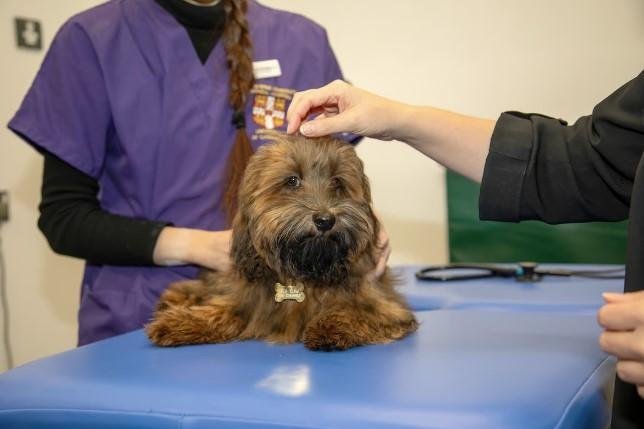The AI program detected heart murmurs in dogs with 90% accuracy, comparable to the accuracy of expert cardiologists, researchers report. Photo by Jacqueline Garget/HealthDay
Artificial intelligence can accurately detect heart murmurs in dogs, a new study shows.
The AI program detects heart murmurs in dogs with 90% accuracy, comparable to the accuracy of expert cardiologists, researchers report.
And in more than half of the cases tested, the AI fully agreed with a cardiologist’s assessment of the severity of the murmur.
This heart murmur is an important indicator of valvular heart disease, the most common heart disease in adult dogs, researchers said.
About 1 in 30 dogs seen by a veterinarian have a heart murmur, researchers said in background notes. The condition is higher in small breed dogs and older dogs.
Early detection is crucial because timely medication can extend their lives, researchers say.
“Heart disease in humans is a major health problem, but in dogs it is an even bigger problem,” said lead researcher Andrew McDonald, research associate in stethoscope acoustics at the University of Cambridge’s Department of Engineering.
“Most smaller dog breeds will develop heart disease as they get older, but dogs obviously cannot communicate in the same way as humans, so it is up to frontline veterinarians to detect heart disease early enough so it can be treated.”
For the study, researchers started with a database of heart sounds collected from about 1,000 patients using a digital stethoscope. They developed an AI program to check for heart murmurs and then adapted it so it could be used in dogs.
“To our knowledge, there are no existing databases of heart sounds in dogs. That’s why we started with a database of heart sounds in humans,” said researcher Anurag Agarwal, professor of acoustics and biomedical engineering at the University of California. University of Cambridge.
“The hearts of mammals are quite similar, and when things go wrong, they tend to go wrong in similar ways.”
The team then tested the AI on almost 800 dogs undergoing routine heart examinations at four veterinary clinics in Britain
“Mitral valve disease mainly affects smaller dogs, but to test and improve our algorithm, we wanted to obtain data from dogs of all shapes, sizes and ages,” explains researcher Dr. Jose Novo Matos, professor of small animal cardiology at Cambridge’s. Department of Veterinary Medicine.
“The more data we have to train it, the more useful our algorithm will be, both for veterinarians and dog owners.”
The researchers have refined the AI so that it can detect and assess heart murmurs based on digital recordings, distinguishing between murmurs caused by mild heart disease and murmurs resulting from advanced disease.
The AI agreed with an expert cardiologist’s assessment in more than half of the cases tested, researchers report. About 90% of the time the AI’s assessment was within one degree of the cardiologist’s assessment.
The new study was published Monday in the Journal of Veterinary Internal Medicine.
“The degree of heart murmur is a useful differentiator for determining next steps and treatments, and we have automated that process,” McDonald said in a Cambridge news release.
“For veterinarians and nurses without as many stethoscope skills, and even for those who are incredibly skilled with a stethoscope, we think this algorithm could be a very valuable tool.”
Medications are available to help dogs with heart valve disease, while in humans the only available treatment is surgery, the researchers noted.
“Knowing when to medicate is so important to give dogs the best possible quality of life for as long as possible,” Agarwal said. “We want to empower veterinarians to help make these decisions.”
“So many people talk about AI as a threat to jobs, but for me I see it as a tool that will make me a better cardiologist,” said Novo Matos. “We can’t do heart scans on every dog in this country – we just don’t have enough time or specialists to screen every dog with a murmur.
“But such tools can help veterinarians and owners so we can quickly identify the dogs most in need of treatment.”
More information
The American Kennel Club has more about heart disease in dogs.
Copyright © 2024 Health Day. All rights reserved.





